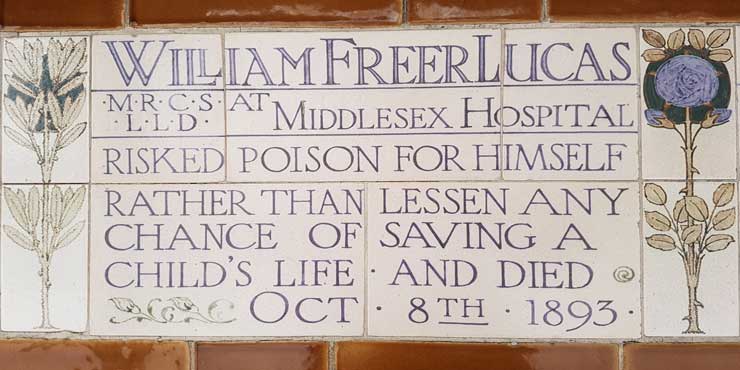
William Freer Lucas (1870 - 1893) was a doctor who paid for his devotion to duty with his life.
His memorial plaque in Postman's Park reads, "William Freer Lucas M.R.C.S.L.L.D At Middlesex Hospital Risked Poison For Himself Rather Than Lessen Any Chance Of Saving A Child's Life And Died. Oct 8TH 1893."
Under the above headline, The Shields Daily Gazette reported on the circumstances surrounding his demise in its issue of 18th October 1893:-
"The death has just occurred, in sad and touching circumstances, of Mr William Freer Lucas, of the Middlesex Hospital.
Six years ago he became a student at the hospital school.
Some little time since he was appointed casualty physician, and lately, in the absence of Dr Edward Fardon, the resident medical officer, he acted in his place.
A few days back a child with diphtheria was lying at death's door.
The only possible way of giving it a chance of life was tracheotomy (opening the windpipe), and to do that the patient had to be placed under an anaesthetic.
It was decided to use chloroform, and Mr Lucas was the administrator.
During the inhalation of the chloroform some mucus from the patient's throat was thrown on to Mr Lucas's face.
He did not, however, withdraw the inhaler, but waited until the anaesthetic had acted before he wiped it away.
Its virulent poison had unfortunately done its work. Mr Lucas's system was infected, and he has died in the hospital from diphtheria communicated by the patient whose life he was trying to save."
A common reaction to such deaths was for sundry citizens to be moved to eulogise the deceased in verse, and several people chose to bestow this honour on William Freer Lucas.
One such poem, composed by Annie Roberta Speake. You can read its full text below. I reproduce it here, not out of any regard of it as a particularly memorable poetic masterpiece, but rather because it demonstrated how the cult of the humble, everyday hero was gaining momentum throughout the 1890's.
The peom was initially published by Fun magazine under the banner "A Hero's Death". It was then reproduced in several newspapers countrywide, including The Cornishman, which treated its readers to the full text in its issue of 26th October 1893:-
"Lines on Dr. W. F. Lucas, of Middlesex Hospital, who died from the consequences of operating on a child suffering from diphtheria."
"Heroic soul! whose noble deed to save
From death a little child, hat yielded up
Thy life, so full of promise here below:
No laurel wreaths adorned thy glorious brow.
Nor o'er thy sympathetic heart was placed
The token valour gives to bravest men,
Who in the battle-field stand not alone,
But face stern death with comrades by their side
And Glory's beck'ning hand to ead them on.
Ah! how enobling is the very thought
Of thy self-sacrifice to lesser man.
That act of thine hath torn away the very veil
From eyes which could not see such lofty aims.
Or put their trust in goodness heaven-born.
How justly proud are we of those who rest
Beneath the Abbey's high and mighty dome
Who lived to make our country purer, free.
How to our hearts the wounded soldier comes,
And he who travels far in foreign lands
Finds fame at last in our adoring eyes.
All praise to them, but greater praise to thee.
Who had no hero-worship given to
That deed of thine 'ere thou to death went down.
But in the quietude of lonely homes
Are lives and hearts uplifted to thank Heav'n
That men like thee in angel's guise still trod
This earth, among her sordid, selfish sons.
The world had need of thee, O noble heart,
To teach it how to live, and how to die."